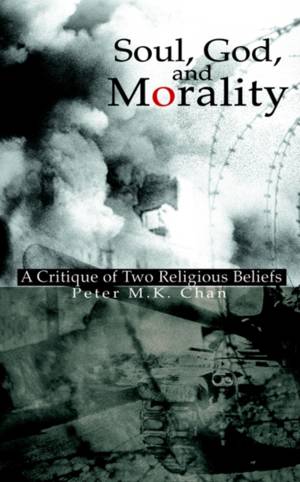
Je cadeautjes zeker op tijd in huis hebben voor de feestdagen? Kom langs in onze winkels en vind het perfecte geschenk!
- Afhalen na 1 uur in een winkel met voorraad
- Gratis thuislevering in België vanaf € 30
- Ruim aanbod met 7 miljoen producten
Je cadeautjes zeker op tijd in huis hebben voor de feestdagen? Kom langs in onze winkels en vind het perfecte geschenk!
- Afhalen na 1 uur in een winkel met voorraad
- Gratis thuislevering in België vanaf € 30
- Ruim aanbod met 7 miljoen producten
Zoeken
€ 19,45
+ 38 punten
Omschrijving
Soul, God, and Morality is designed to take good care of two religious postulates: the existence of persons as souls in the hereafter, and the existence of God. Of the postulate, what the author offers is a well-structured and conclusive argument to show that a human being could not possibly be the composite of a body and a soul. Further, he contends that in view of what is known of correlations that exist between brain and mind, it is time for all to see that the soul theory in all its forms is explanatorily redundant. As to the existence of God and deities, the author argues that the only justifiable stance to take is to remain humbly and agnostically silent. He further argues that the ground of morality is naturalistic, and that the following question should now be recognized as relevant: What is the role of religion in an agnostic (with respect to the supernatural) and soul-less (or neuroscientific) world? All in all, what Soul, God and Morality offers is not just another critical Introduction to the Philosophy of Religion. Unlike the normal run of text, it is heavy footed on the soul theory, or the religious belief that the human mind is able to persist in the form of a disembodied soul into a spiritual hereafter. But the author also believes that with or without God, there is no excuse for not trying to be moral.
Specificaties
Betrokkenen
- Auteur(s):
- Uitgeverij:
Inhoud
- Aantal bladzijden:
- 132
- Taal:
- Engels
Eigenschappen
- Productcode (EAN):
- 9780595322077
- Verschijningsdatum:
- 23/09/2004
- Uitvoering:
- Paperback
- Formaat:
- Trade paperback (VS)
- Afmetingen:
- 127 mm x 203 mm
- Gewicht:
- 149 g

Alleen bij Standaard Boekhandel
+ 38 punten op je klantenkaart van Standaard Boekhandel
Beoordelingen
We publiceren alleen reviews die voldoen aan de voorwaarden voor reviews. Bekijk onze voorwaarden voor reviews.









